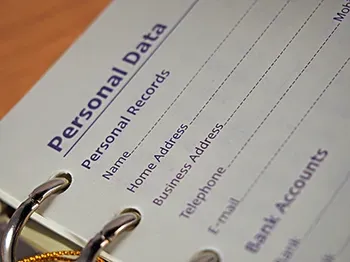Planning Ahead
Taking the First Step with Recording Personal Information
Having the discussion about the type of funeral services that you or your loved ones would like is not an easy discussion to have. Most people shy away from even thinking about the topic of death, let alone actually discussing it.
One tool that can help get a conversation started and ease into this discussion is preparing a personal information list. Sometimes referred to as an In Case of Emergency or ICE document, this compendium of personal details will help organize important documents and information in one place. Having an ICE document for family provides emergency contact information and makes it easier for members to manage your affairs if you are not able to.
An ICE document can be as simple (a single page) or as detailed (a folder or booklet) as you would like. Recording this important information will provide your family a helpful guide in case of emergency and can often open the window to a larger discussion about what your family would want for a funeral service and memorial.
Personal Information to Include
Each ICE document will be a little different, but here’s a general list of information that you should consider including:
- Full legal name (nicknames or former names)
- Preferred name and/or pronouns (if different from your legal name)
- Date and place of birth
- Social Security number
- Current address and phone number
- Names and contact information of immediate family members (spouse, children, parents, siblings)
- Emergency contacts (names, phone numbers, and relationship to you)
- Medical history (and current medications)
- Healthcare provider contacts
- Health and life insurance policies
- Legal documents (will, power of attorney, advance directives, etc.)
- Banking and investment account information
- Safety Deposit Box information
- Login credentials and passwords (location of logins for online accounts and subscription services)
- Military service records (if applicable)
- Contact information for key advisors (such as attorney, accountant, or financial planner)
You can also add a category for Funeral Arrangements, which would include details about your final wishes—such as cremation or burial, open or closed casket, type of memorial service, and any specific requests for music, readings, or personal touches.
To help you get started, the Buch Family of Funeral Homes has created an In Case of Emergency template. Once this document is created, it’s a good idea to review and update it at least once a year, since details can change. Most importantly, let a trusted family member know where this document is kept so it’s easy to find if it’s ever needed.


